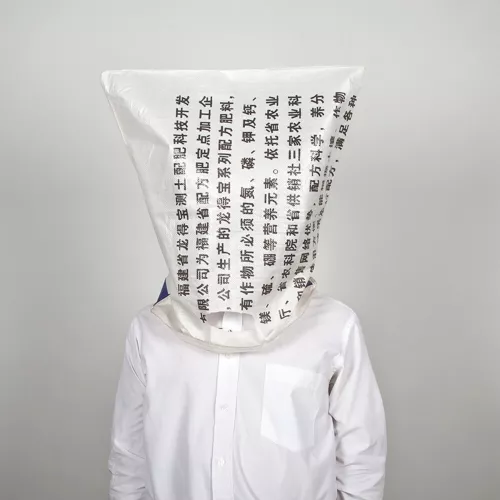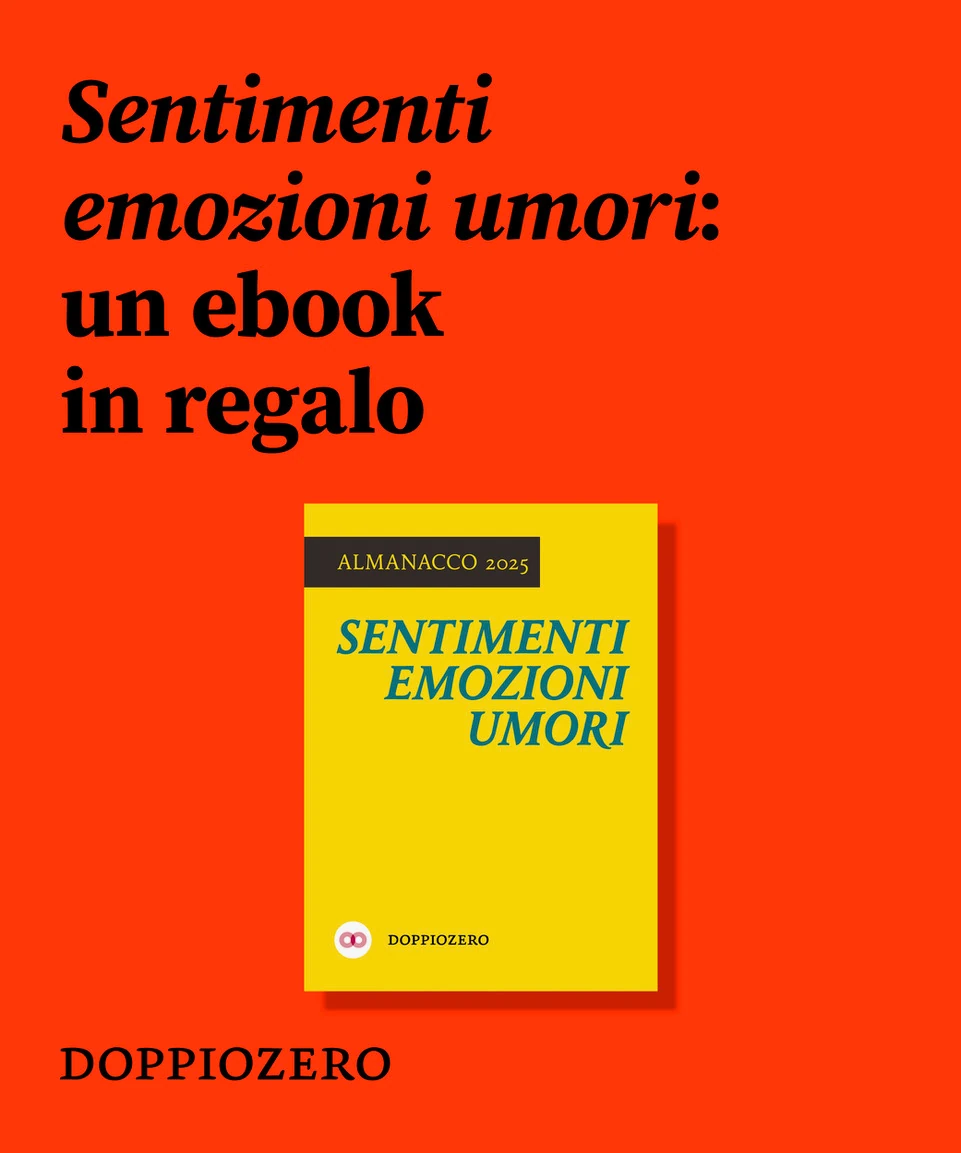Speciale
The Divine Comedy Exhibition: A Journey Beyond Words
Here the column's introduction: Why Africa?
What goes on during the creative process? How does the thread – connecting an idea, a reference or a suggestion with the completed artwork – unfold? Beyond Words, the section from the catalogue of The Divine Comedy: Heaven, Purgatory, and Hell Revisited by Contemporary African Artists – the exhibition curated by Simon Njami, now in its third stop at Washington DC’s Smithsonian National Museum of African Art– follows these threads through the subjective narrative of each involved artist. Every artist has selected an important word to describe his/her work and connection to Dante’s Divine Comedy. Grace, Experience, Hope, Fear ... These words sum up the idea, behind the inspiration, connecting on a logic and emotional level the author and the universal themes of Dante’s work. The selection of images, thoughts and words taken from the catalogue, courtesy of the curators, allow us to connect with the artists, listening to their voices, stories and poetics, and to approach the artwork as one of the possible guises adopted by the creative process, deeply linked to each author’s life, dreams and visions. Enjoy the journey.
Read also: lettera27, Emotions, struggles, life, love, loss, between here and elsewhere
GRACE | Bili Bidjocka
GRACE noun: a way of moving that is smooth and attractive and that is not stiff or awkward.
Grâces&Intentions
ON NAIT DANS L’ESPACE DE LA PEINTURE /
Dès la première gorgée / Je glisse / Pente / Chute /
Boue / Dans ma chute /Mords-Me /Moi-même /
Le calice est vide / Vidé dans ma bouche /
Sanguinosa bava / Perdu le bout de la Langue /
Ma source des mots / Démon / Le Grand Chien de
l’Escalier / Détresse des papes / Aide-Me /
SPREZZATURA / ‘Cred’ïo ch’ei credette ch’io
credesse’ / Even by the grace of my silk hat and
these gathers / Univocal predication is impossible
between / ‘Equivocando in sì falsa lettura’ / I reach
/ The Informing Spirit / The divine obscurity /
‘Lux in tenebris’ / Here /Mediocrità difficile /
Made me more polite / Less sincere / OU ON NE
L’EST PAS.1 B.B.
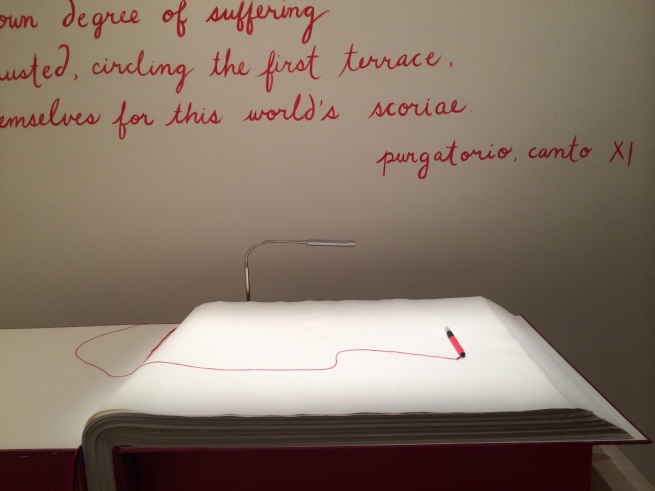
Bili Bidjocka, Ecriture Infinie/Infinite Writing, 2014. Courtesy of SCAD Museum of Art, Savannah, USA
***
HOPE | Ato Malinda
HOPE noun: the feeling of wanting something to happen and thinking that it could happen: a feeling that something good will happen or be true.
Old / are the stories / in her golden rust / that form /
Romantic / maps / as they / peel / away / these
stories / that / weave / like a thread / through / her
dress / that / floats in the / breeze / she squirms /
through / the traffic / and the / traffic / navigates /
around her / she holds onto her space / playing /
singing / performing / as she grows.
I wrote these words about my experiences making the video performance piece, On Fait Ensemble, and the city of Douala, Cameroon. The title of the video piece is a play on words from the Cameroonian colloquialism, ‘on est ensemble’, meaning ‘we are together’. This relation to the word ‘hope’ is one of hopefulness and solidarity. The video is about contemporary Africa and the challenges we have endured as new nations since the bondage of colonialism arrived in our homes. Yet despite what may seem like insurmountable hardships, we endeavour to work together, to build a land. There is pride, resourcefulness and commonality about being African that resonates within me and out toward my fellow Africans. This black, African, female body desires a space of urban permissiveness on my continent where colonial sanctioning of times past leaves us like the weaver bird in flight on my grandmother’s farm; where African female sexuality speaks not of bare breasts from a colonial lens but of muliebrity and power. To speak of my ninety-year-old grandmother, her patience unfaltering; on her farm the mango trees grow with the lone orange, and the eucalyptus sing poetry of mysticism, the jacaranda blooms reflect the moon at dusk as the lights in the house turn on. As she knits sweaters for her grandchildren and great-grandchildren, the strength of her arthritic hands remind of this power. When I am home, I am hope. A.M.
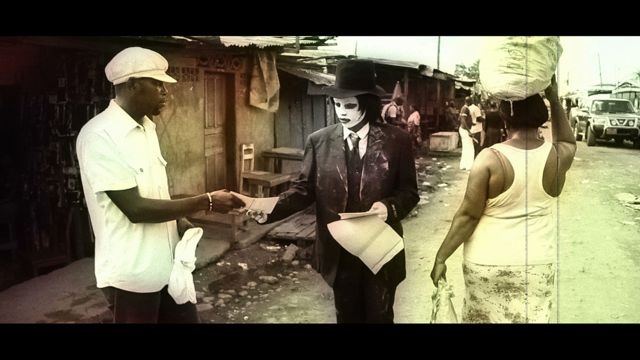
Ato Malinda, On Fait Ensemble, 2010. The Divine Comedy. Heaven, Purgatory and Hell Revisited by Contemporary African Artists, catalogue, ed. Mara Ambrožič, Simon Njami, Kerber Verlag Bielefeld, 2014
***
OBSCURE | Joël Andrianomearisoa
OBSCURE adjective: not well-known: not known to most people.
Dark Black
The night is black / Black is colour / Black 1000
colours / Black is illegal / Black is sentimental /
Black is everything, Black is nothing / Black is
enigma / Black is black / Black is attitude / Black is
chic / Black is rebellious / Black is sensual / A
BLACK / Black is fatal / Black is total / Black is
fragrance / Black is experience / Black is
atmosphere / Black is mood / Black is image / Black
is surface / Black is dream / Black Magic / Black is
tragic / Black is evil / Black is magical / Black is
magnificent / The room is black / Black is desire /
Black passion / Black is enjoyment / Black is
pleasure / Black is light / Black is being / Black is
living / Black is ecstasy / Give me a kiss. A Black
kiss / I LOVE YOU. J.A.
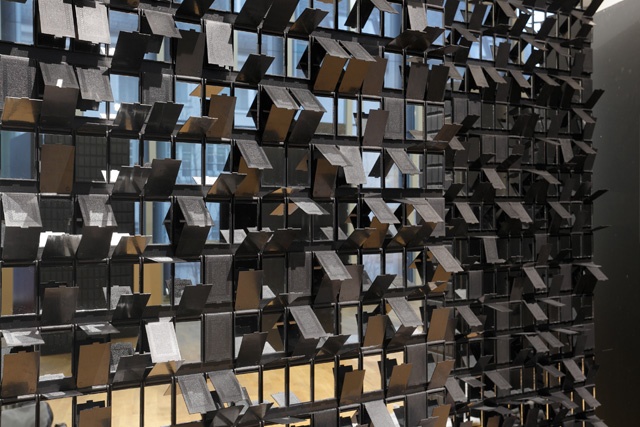
Joël Andrianomearisoa, Sentimental Negotiations Act V, 2013. The Divine Comedy. Heaven, Purgatory and Hell Revisited by Contemporary African Artists, catalogue, ed. Mara Ambrožič, Simon Njami, Kerber Verlag Bielefeld, 2014
***
TEARS | Aïda Muluneh
TEAR noun: a drop of clear saline fluid secreted by the lacrimal gland and diffused between the eye and eyelids to moisten the parts and facilitate their motion.
Coming from Ethiopia and having been raised most of my life in the Ethiopian Orthodox Church, my perception of the concepts of heaven and hell is formed by the cultural implications of our religion. As background information, the Ethiopian Orthodox is one of the most ancient forms of Christianity in Africa, and through our church there is a great deal of mysticism that you don’t find in other forms of Christianity. Our history is long-standing and the belief that we are the host for the Ark of the Covenant is still an international mystery. With this in mind and having done some research on the topic of tears as it relates to Dante’s Inferno, the section that I found interesting relates to Canto XX, in which Dante encounters the backward-turned heads of Amphiaraus, Tiresias, Aruns and Manto. Coming from a very conservative society, in which sorcery, fortune telling and spells are often looked down upon, I found it interesting that these rituals are nonetheless practised behind closed doors and often stem from the church. Hence, I would like to produce four pieces in which I offer the viewer my interpretation of the sins of Amphiaraus, Tiresias, Aruns and Manto. In these art works, photography, paint, line drawings and the text of the Psalm of David in Amharic (the Ethiopian language) combine with the prayers of repentance. I chose to combine these elements because for me they incorporate both my cultural background and the combining of something digital such as the photograph with an analogue element, such as my line drawing on photo paper. More specifically, the line drawings that I have been doing for the past couple of years are in a sense inspired by traditional holy scrolls, which is basically a long thin piece of leather that is cut, based on the person’s height. On the piece of leather, a prayer for protection or toward off illness is drawn, along with verses from the Bible. It is an ancient form of holy scroll but not accepted by the Church because it is considered sorcery; however, the various symbols stem directly from the Church. Therefore, my inspiration is also from these forms that I find so fascinating. A.M.
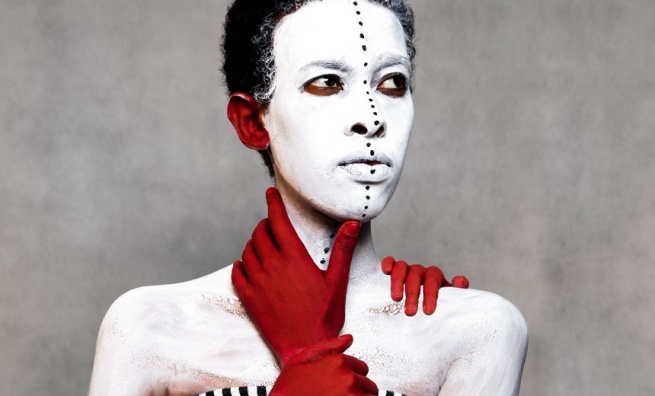
Aïda Muluneh, 99 Series, 2012. The Divine Comedy. Heaven, Purgatory and Hell Revisited by Contemporary African Artists, catalogue, ed. Mara Ambrožič, Simon Njami, Kerber Verlag Bielefeld, 2014
***
FEAR | Andrew Tshabangu
FEAR noun: an unpleasant emotion caused by being aware of danger: a feeling of being afraid.
One thing that plagued me prior to arriving in Twasana was fear. I feared for my wellbeing, safety or whether I was going to be accepted by the nuns, priest and the community of Twasana. While I have been here, I have never feared for my safety or my wellbeing. I have been embraced with open arms by the nuns, the priest and the community alike. I have been touched by the commitment, vision and love they have for each other. When I arrived, it was overwhelming and I felt amazed that I was here. It has been incredibly eye-opening, heart-moving, soul striking and soul-starring. When I arrived, there was something that I could not put my finger on. I was filled with compassion and love. I was shocked and surprised to discover that I was capable to be surprised and moved by simplicity. My stay at Twasana is about to come to an end. I came to here to take photographs, but instead a window on my soul has been opened. A.T.
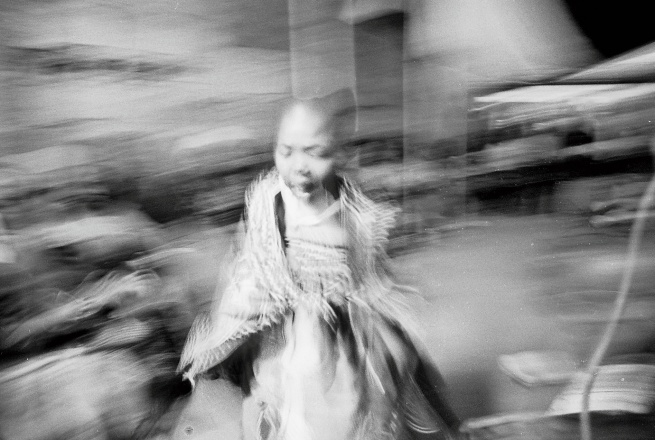 Andrew Tshabangu, On Sacred Ground, 1999-2008. The Divine Comedy. Heaven, Purgatory and Hell Revisited by Contemporary African Artists, catalogue, ed. Mara Ambrožič, Simon Njami, Kerber Verlag Bielefeld, 2014
Andrew Tshabangu, On Sacred Ground, 1999-2008. The Divine Comedy. Heaven, Purgatory and Hell Revisited by Contemporary African Artists, catalogue, ed. Mara Ambrožič, Simon Njami, Kerber Verlag Bielefeld, 2014
***
JOURNEY | Youssef Nabil
JOURNEY noun: an act of travelling from one place to another.
Death is a fairly simple word with innumerable definitions
and possibilities. And for every single person
living today, it has a different meaning, a different
reality. For me, death is an old companion that I
think of every day, all the time. Everything I do or
anyone I see or meet, for me, could be for the very
last time. Every moment I live could be the last. That
is how I live and see my life. As a child, it was very
painful for me to discover that we are all going to
die. I would pray to be the first in my family to die.
Since then, I have lived my life, and experienced
moments with that singular perspective always at
the back of my mind. In a very cinematic way, as I
always considered life like ‘a movie’ with a beginning,
an end and a story in between to be told. I
wanted to keep everyone I love alive in my movie,
my life. I have always known that I am here to leave,
not to stay. And the more I thought of death, I thought
of the afterlife, of going to paradise. I will go to Paradise,
Self-portrait, Hyères 2008 is almost a yearning
to understand and embrace the finality of death
and to immortalise the self. As I walk towards the
setting sun and into the waters that receive me, moving
on to the other world, I present my own captivation
with defining the different identities that I
have found myself moulded into. We are surrounded
by religious, cultural, political and social ideals
and norms that one is expected to adhere to constantly.
One misstep and we are instantly pointed
out and judged. And it becomes all too easy to label
those who are going to heaven and those who are
going to hell. And more often than not, it’s the latter.
I have always been irked by this moral policing.
Why should someone else decide whether I should
go to hell? And so I decided that I am going to heaven,
to paradise. For me, everyone is going to paradise. Y.N.
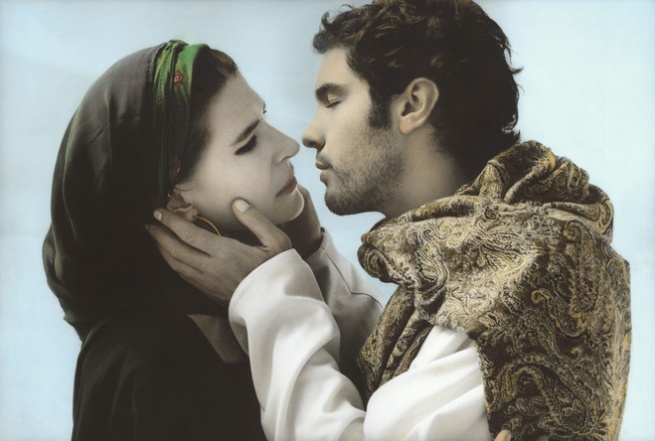 Youssef Nabil, You Never Left #III, 2010. The Divine Comedy. Heaven, Purgatory and Hell Revisited by Contemporary African Artists, catalogue, ed. Mara Ambrožič, Simon Njami, Kerber Verlag Bielefeld, 2014
Youssef Nabil, You Never Left #III, 2010. The Divine Comedy. Heaven, Purgatory and Hell Revisited by Contemporary African Artists, catalogue, ed. Mara Ambrožič, Simon Njami, Kerber Verlag Bielefeld, 2014
***
EXPERIENCE | Amal Kenawy
EXPERIENCE noun: the process of doing and seeing things and of having things happen to you.
My works focus on presenting images of my society.
They may take on a political dimension, but my
approach to my subjects is on a much more personal
level. I do not refer to the causes of certain issues or
events, or even the events themselves as they relate to
a particular society as a whole. Instead, I always
search for their results, for the effect that these issues
and events have on the individual. This approach
stems from my understanding of the part as a model
for the whole. I may have a heart that beats and functions
regularly, but I cannot confirm that I am alive.
Emotions inhabit this human frame and make a vessel
of it. These abstract/removed emotions, which
fluctuate between making up my memories and my
dreams, appear to me as constituting my true self, a
self that I can see clearly, beyond the narrow confines
of my body. I keep a kind of diary which, over time,
has become my private space. It enables me to negotiate
the elusive boundaries between the imaginary
and reality. I have used my diary as a point of departure
for my work that allows me to communicate
emotions which lie hidden beneath the surface of my
physical/material existence. A.K
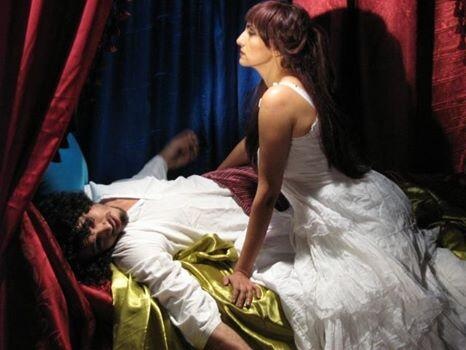
Amal Kenawy, The Fighter Red Fish, 2010. The Divine Comedy. Heaven, Purgatory and Hell Revisited by Contemporary African Artists, catalogue, ed. Mara Ambrožič, Simon Njami, Kerber Verlag Bielefeld, 2014
***
DAMAGE | Moataz Nasr
DAMAGE transitive verb: to physically harm (something).
Damaged man...Damage, damage,
damage...Damaged soul...damaged heart...
Damaged man...Damage, damage,
damage...damaged child...damaged
wife...damaged life...damaged man... Damage,
damage, damage...damaged lungs...damaged
bones...damaged mind...Damaged
man...damage...damage...damage...damaged
words...damaged book...damaged
picture...damaged house...damaged
fence...damaged man... Damage, damage,
damage...Damaged streets...damaged
city...damaged train, plane, automobile...
Damaged man...Damage, damage,
damage...damaged song...damaged
lyric...damaged record... Damaged man...Damage,
damage, damage...Damaged birth...damaged
life...damaged death... Damaged man...Damage,
damage, damage...Damaged grain...damaged
seed...damaged flower...damaged tree... Damaged
man... Damaged
man...man...man...man...DaMaGeD. M.N.
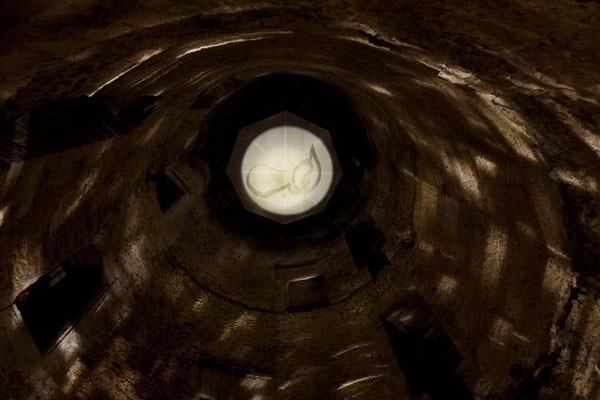
Moataz Nasr, Dome, 2011. The Divine Comedy. Heaven, Purgatory and Hell Revisited by Contemporary African Artists, catalogue, ed. Mara Ambrožič, Simon Njami, Kerber Verlag Bielefeld, 2014
***
SATIN | Mohamed Bourouissa
SATIN noun: a fabric (as of silk) in satin weave with lustrous face and dull back.
Well I don’t really know quite where to start, let’s say the work was chosen in relation to the place that I chose, which is hell. The video I propose is a kind of golden calf. And that’s why I think of that famous scene in the Ten Commandments, where Moses’ people are found worshipping a golden calf – that’s what satin makes me think of. I also think there are references to Orientalist painting in the film that resemble Delacroix’s work or Eugène Ferdinand’s painting of Dante, and satin is predominant. But my project is not about satin any more, it’s about the machine, the machine that cuts, strikes, washes, turns things into value and signs. This machine strikes the portrait of Booba. Booba is a French rapper whose writing and image represent the desire to be integrated in this world of power that is money. In the images I sent you, you will see references to satin. This image comes from a rap video by Booba called Caramel. M.B.
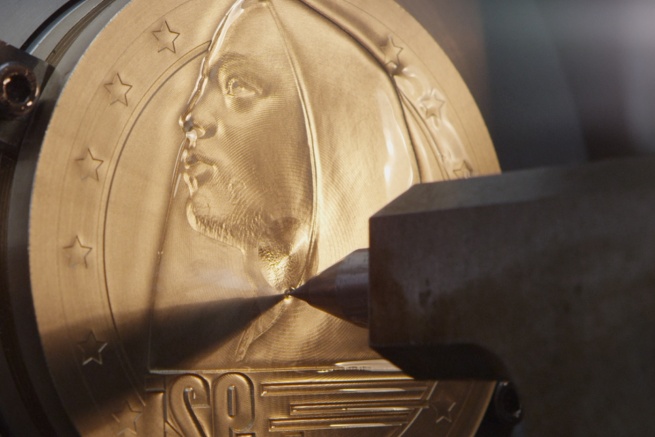 Mohamed Bourouissa, All-In, 2012. The Divine Comedy. Heaven, Purgatory and Hell Revisited by Contemporary African Artists, catalogue, ed. Mara Ambrožič, Simon Njami, Kerber Verlag Bielefeld, 2014
Mohamed Bourouissa, All-In, 2012. The Divine Comedy. Heaven, Purgatory and Hell Revisited by Contemporary African Artists, catalogue, ed. Mara Ambrožič, Simon Njami, Kerber Verlag Bielefeld, 2014
***
SLEEP | Edson Chagas
SLEEP noun: the natural state of rest during which your eyes are closed and you become unconscious.
Soporific / Soporific, loaded in the conscious
mind…/ If you know where it is! /Why do you
hide the salt that / I need for my nourishment? / If
you saw it! /Why do you keep those words out of
my eyes? / Get out of my way! / Unnecessary
Miracle. /Welcome! / Unreasonable thought! Give
me what I need. /While I kill time getting lost in
this sea full of white petals. / Let me stay! / In my
own corner, enlightened with my own darkness. /
Because what I have seen it! Is light full of
darkness. / Like the guilty one, disguised with /
forgiveness. / I deny it the whole truth and
disappear like a fog. / That wanders in the morning
of any day, FULL STOP. E.C.
